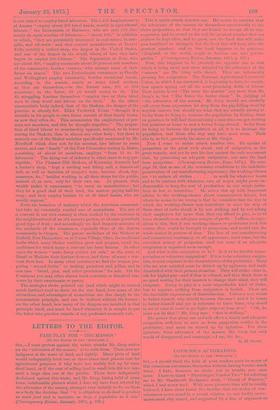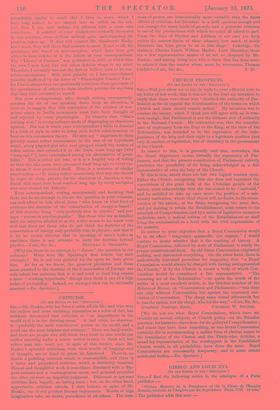CONSCIOUS AUTOMATONS.
[TO THE EDITOR OF THE SPECTATOR."]
Srn,—I should think the bulk of your readers must be weary of this conscious-automaton discussion without having become much wiser. I have, however, no choice but to trouble you once more. I have to thank " Physiologist Number Two " for referring me to Mr. Shadworth Hodgson's work, " Theory of Practice," which I had never read. With more pleasure than will be readily believed, I have there found the doctrine that our states of con- sciousness never stand in a causal relation to our bodily move- I merits most ably stated, and supported by a line of argument so remarkably similar to much that I have in notes, which I have long wished to see shaped into an article on the sub- ject, that 1 can now indulge my idleness with a more easy conscience. A number of your readers are evidently interested in this question, some of them without quite understanding the position taken up. If they will consult Mr. Shadworth Hodg- son's work, they will there find answers to most, if not to all, the questions, not based on misconception, which have been put either in your articles or in the letters of your correspondents. The "Theory of Practice" was published in 1870, at which time the view I now hold had not taken definite shape in my mind. Therefore I certainly was not the first to believe men to be con- scious automatons. Still, such priority as I have ever claimed remains unaffected by the letter of "Physiologist Number Two," for I have always been too profoundly conscious of my ignorance of the speculations of others to claim absolute priority for anything that may have occurred to myself.
But your correspondent, who, though writing anonymously, assumes the air of one speaking down from an elevation, is anxious to suggest that this conception of the relation of con- scious states to bodily movements must have been thought of and rejected by every physiologist. To observe that "that's nothing new," is a very ordinary mode of disparaging an obnoxious opinion. But was it worth your correspondent's while to descend to a trick of style in order to bring such feeble condemnation to bear on this automaton theory. He says my " eagerness to claim priority seems rather unnecessary, in the case of an hypothesis which every physiologist who ever grasped clearly the notion of reflex action, and extended it to the brain, must long ago [why "long ago ?"] have entertained among his alternatives of possi- bility." This is either not true, or it is a lengthy way of telling us that the idea must have presented itself long ago to every one to whom it ever presented itself. Here is a sentence of similar construction :—' It seems rather unnecessary that any one should be eager to claim priority for the discovery of America, a con- tinent that must have been reached long ago by every navigator who ever crossed the Atlantic.'
Your correspondent, writing anonymously and knowing that there can be no attempt to discuss the question in your columns, can well afford to talk about those " who know on what kind of evidence the doctrine of the conservation of energy is based ;" of this doctrine being " only probably true in physics," and per- haps " untrue in psycho-physics." But those who are as familiar with the subjects alluded to as the writer seems to be, know very well that there are those who do not think the doctrine of the conservation of energy only probably true in physics ; and that it is by no means obvious that in speaking of men's bodies as machines, there is any attempt to carry the doctrine beyond [Why can there be no attempt to " discuss" the question in our columns? What were Mr. Spalding's first letters but such attempts ? He is not very grateful for the space we have given him. As far as we know, the greatest physicists and those most attached to the doctrine of the Conservation of Energy, not only admit but maintain that it is and must at least long remain a mere "working hypothesis," though they think it one of a high order of probability. Indeed, no stronger view can be rationally asserted.—En. Spectator.]







































 Previous page
Previous page